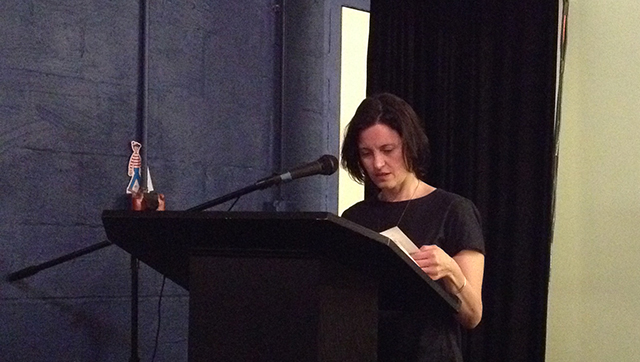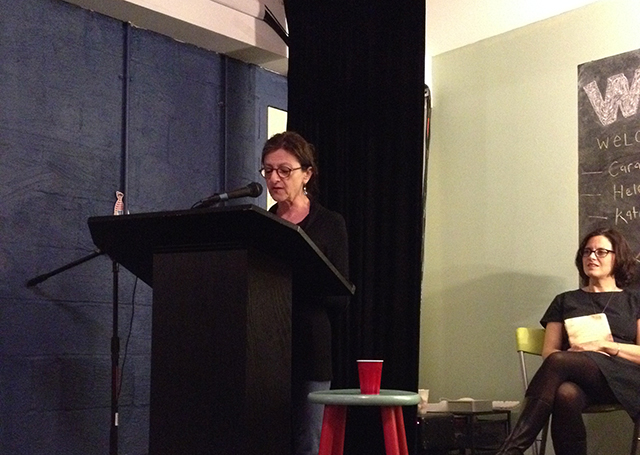
Traditional war stories have long featured male protagonists by default. But modern war has meant female soldiers serving alongside their male counterparts. Brooklyn’s WORD Bookstore brought together three authors to talk about their war story books books featuring female soldiers. Cara Hoffman’s new novel, Be Safe I Love You (April 2014) explores the family life of a returning war veteran readjusting. Katey Schultz’s collection Flashes of War (2013) contains a mix of flash fiction and short stories. Helen Benedict has spent several years interviewing soldiers and victims of war resulting in a play, a non-fiction book, and a trilogy. She read from Sand Queen (2011), a novel of two opposing narratives, one an Iraqi medical student caught in a war prison and the other a soldier prison guard.
Each woman read a selection from their respective books before Benedict launches the discussion. The main issues at stake for them are: why write about women in war and how are their stories different from men’s stories. Benedict offers some statistics: 90% of war deaths are civilians, and of those 70% are women and children making them the overwhelming victims of war. By 2006, more women had been wounded or killed in Iraq than all the other US conflicts combined since World War II.

Hoffman explains that for her, writing about military families was personal. She comes from a military family. Her brother served in Afghanistan before he was wounded. Because of those personal experiences, she wanted to write about the issues, especially because they were so related to class. “Its pretty impossible to talk about the army and the enlisted without talking about class,” she says.
“For me story always begins with unanswered questions,” Schultz says. She doesn’t come from a military family. She was not a war journalist. She has not been to the Middle East. She has generally speaking, been very far away from the war. But that’s what interested her: understanding what this war meant.
Schultz adds that she also thinks of the global war on terror as changing language. Words like “freedom” mean different things now. New words like “IED” have been added to the regular lexicon. Ultimately, writing about these issues helped her make sense of it.
For Benedict who began with interviews of war victims, she had no idea the project would spawn as much writing as it had. “I was very distressed by what we had been doing with these wars,” she said. So she started out talking to women soldiers.

Female soldiers have a very different experience, Benedict explains. All the lore about brotherhood and camaraderie that make up the mythology of soldiers seems lost on women. They failed to share in that kind of companionship. Women in the military were being raped or harassed. Often other soldiers showed a lack of respect. Since women were never accepted in the soldiers’ “club,” they were never sucked into the kind of blind devotion.
Instead, the women soldiers talked about slaughtering civilians. They talked about depleted uranium and the resulting birth defects among local civilians. They showed humanity.
Though none of the authors have served in the wars, all three have done extensive research. Hoffman explains when her brother returned from war, he subjected their family to a slideshow of all the things he blew up.
“Everyone has a part this dialogue,” Hoffman says of talking about the war.
For Schultz, the point of her stories is finding the little moments of insight. War stories lend themselves to finding these truths.
.jpg)
Just because civilians write about these experiences, Benedict adds, that doesn’t exclude military people from writing about the issues. The greater concern should be the assumption that civilians will never understand a soldier’s experience and in so doing, the civilian gives up attempting to understand and the soldier stops attempting to get the civilian to. Benedict says she wanted to try and make that bridge.
If these issues make people uneasy, that’s okay too. “You want the reader to like your characters, but that doesn’t mean can’t be difficult,” Benedict concludes.
Cara Hoffman, Helen Benedict, and Katey Schultz
WORD Brooklyn
Thursday, April 24, 2014